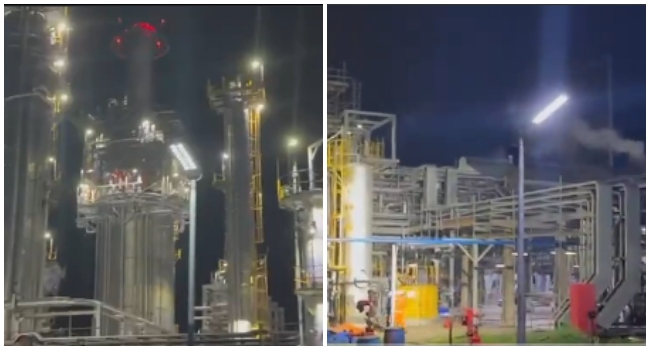Processing of crude oil commences at Port Harcourt refinery.
Petroleum products are now being refined at the Port Harcourt Refining Company (PHRC) Ltd. facility in Rivers State.
Chief Corporate Communications Officer of the Nigerian National Petroleum Company Limited (NNPCL), Femi Soneye, has given his word on the matter.
Nigeria has accomplished a great feat today with the formal start of crude oil processing at the Port Harcourt Refinery. “This historic achievement heralds a new chapter of energy autonomy and prosperity for our country,” Soneye declared on Tuesday.
Our deepest gratitude goes out to President Bola Ahmed Tinubu, the NNPC Board, and GCEO Mele Kyari for their steadfast dedication to this game-changing initiative. We are changing the energy landscape of Nigeria as a whole!
The NNPCL is “working tirelessly to bring the Warri Refinery back online soon,” according to Soneye, and truck loading will also start on Tuesday (or today).
The refinery in Nigeria’s oil-rich Rivers State finally started producing on Tuesday, after many missed deadlines.
The Port Harcourt refinery was originally scheduled to begin production in September, but the announcement was later pushed ahead to December by Heineken Lokpobiri, the Minister of State for Petroleum Resources (Oil), in August 2023.
Mele Kyari, the Group Managing Director of NNPCL, said in March of that year that production will start at the refinery in April.
“We are focused on delivering this rehabilitation project, our two other refineries, and all other investments towards revamping the nation’s refining capacity,” Kyari remarked in August during his inspection of the repair work at the Port Harcourt Refining Company (PHRC) Ltd.
His prediction for 2024 was that the government will turn a profit from the export of petroleum products.
The plant, which was one of the biggest refineries in the country, shut down in 2019 after receiving $1.5 billion (1.2 billion euros) in funding from the federal government three years earlier for repairs.
Nigeria is a major crude oil production, but its inadequate refining infrastructure has meant that the country has had to import petroleum products for many years.
To maintain low prices for its home market, Nigeria has subsidised petrol for years, and now it trades billions of dollars’ worth of oil for it. When Nigeria’s oil earnings were falling and the country was short on foreign currency, fuel subsidies and imports put a significant dent in the country’s foreign exchange reserves.
However, the Dangote refinery did not start producing fuel until September 2024, months after the company said the unit had begun operations.
The group announced that the Dangote Petroleum Refinery has started producing diesel and aviation fuel. For Nigeria, it is a monumental day. We are elated to have accomplished this major goal.
Nigerians anticipate that the Dangote refinery, which is already producing, and the Port Harcourt refinery, which is set to come online soon, would mitigate the effects of the gasoline subsidy’s removal, which caused the price of the commodity to rise from around N200 to more than N1,000 per litre.




